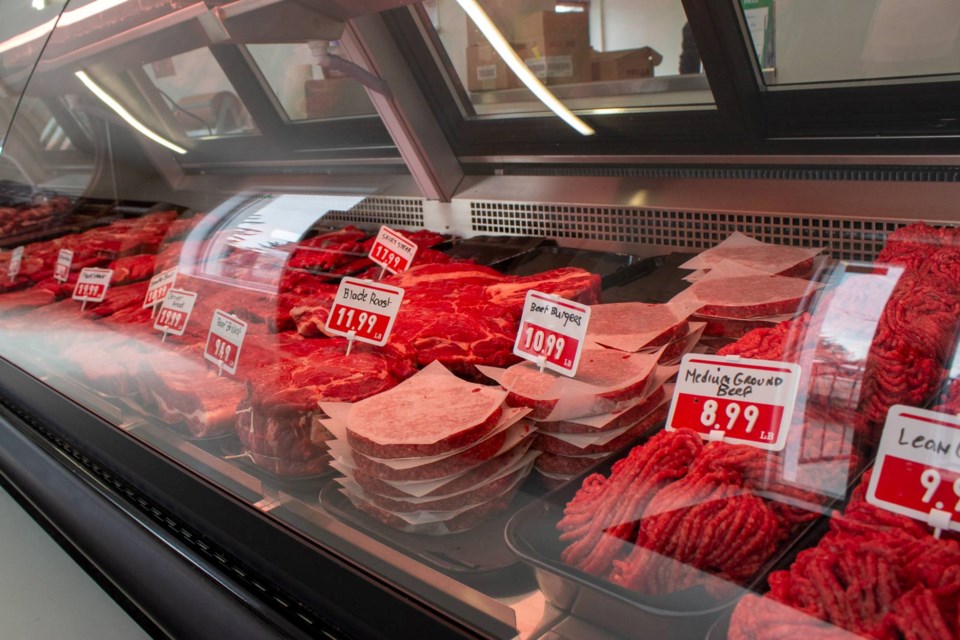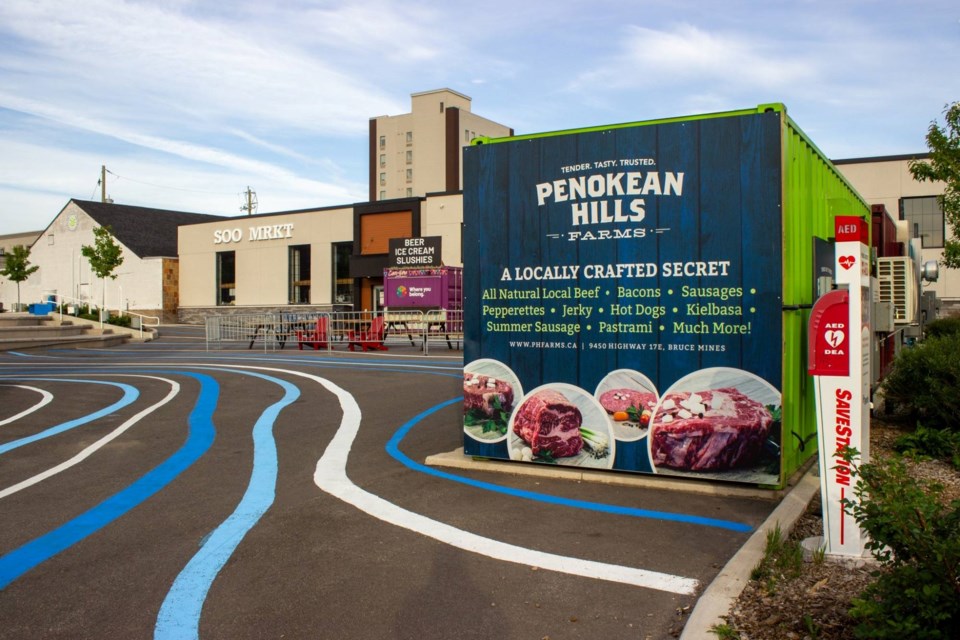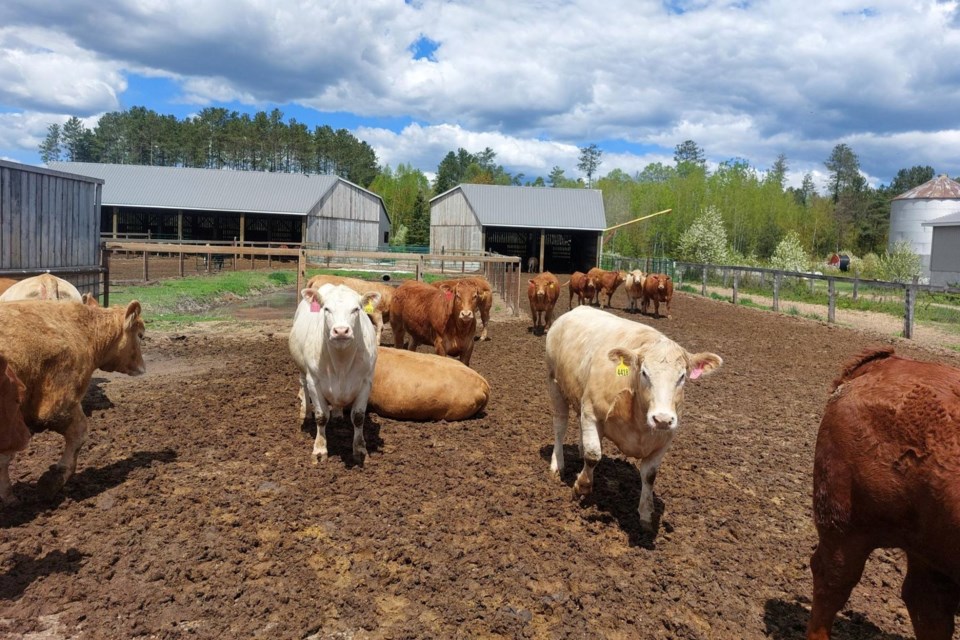After a successful grand opening last month, Penokean Hills Farms, the producer and seller of premium, grass-fed Angus beef, is thriving in its latest retail location, the Penokean Hills Meats butcher shop in North Bay.
“We’re quite pleased with that initial sales, and the support we’re received from the community has been fantastic,” Penokean Hills Farms majority owner Mike Tulloch told Northern Ontario Business.
Over the past six weeks since opening, Tulloch said the store has made huge headway into its goal of building up the company’s weekly sales volume, helping to advance the decision to change focus from wholesale and opt for more local retail locations.
Tulloch ultimately hopes to establish the company’s brand as having different fresh, local, quality products available for all budgets in Northern Ontario.
Most butcher shops have to buy their meat wholesale from elsewhere, Tulloch said, but Penokean Hills Farms has an advantage because they act as their own retail supplier and processing plant, allowing them to control pricing at shops like the one in North Bay.
“Because we own our own animals, we’re immune to the worldwide prices on the international market,” said Tulloch.

In addition to quality pork, chicken, and premium cuts of filet mignon and tenderloin, the North Bay shop also sells ground beef at prices that undercut the grocery store.
“Anyone who works in agriculture knows farmers have a deep-seated passion for selling something to the public … and I take pride in selling quality food on a budget,” Tulloch said.
Penokean Hills Farms began in 2005 as a collective of beef producers from the Algoma, Manitoulin, Sudbury, New Liskeard, and Cochrane areas who raised, finished, and sold their beef under a brand committed to antibiotics-free and hormone-free meat.
They hoped to create healthier, more ethical, and more lucrative business for the northern cattle farmers by maintaining complete control of their own value chain, from genetic selection to feeding to processing and selling their own top-notch products.
Their efforts won the company the Ontario Premier’s Award for Agri-food Innovation Excellence in 2008 for their pea-and-barley finishing diet, and the Company of the Year award at the Northern Ontario Business Awards in 2021.
Previously, up to 90 per cent of their beef was sold wholesale to niche markets down south.
As a result of COVID-19 causing a global increase in cattle prices that squeezed the wholesale market in Toronto, Penokean Hills Farms has pivoted in the last two years to focus on owning and operating retail locations at markets, like their successful locations in Sault Ste. Marie and Sudbury.
“Knowing that we had to get away from wholesale and divert our products to our own retail locations, we were able to develop a new business model that we felt would really work for us,” said Tulloch. “We have a long-term objective to develop more retail stores.”

Over the next five or six years, Tulloch and his partners hope to find additional opportunities for strategic, sustainable retail stores and locations in local markets throughout Northern Ontario, from Muskoka to places like Temiskaming Shores, Cochrane, or Kapuskasing.
North Bay was pegged as an ideal opportunity because the city had no butcher shop or large outlet like Costco, and because it’s located at the “crossroads of the North” on the junction of Highways 11 and 17, said Tulloch.
The location was formerly the Costakos family butcher shop, which opened in 1953.
Tulloch said the building’s current owner, Tony Costakos, was happy to see the tradition carried on by Penokean Hills.
Tulloch has hopes the new location will attract a similar group of loyal local clientele as other retail locations.
In Bruce Mines, a town of only 500, customers routinely make the trip from surrounding towns, and from across the border during the vacation and hunting seasons, to purchase products from the booming retail store there.
SEE: Algoma-raised beef tantalizing southern tastebuds
In 2015, the Penokean Hills Farms collective stepped in to buy the Bruce Mines abattoir, which was on the verge of bankruptcy, in order to obtain a central location for harvesting their own cattle.
Expansions on the abattoir were completed in 2023 with $1.4 million in funding from FedNor. The 14,500-square-foot location now includes a retail store, a kitchen, a smoking facility, a dry-aging room, and a processing and packaging plant that employs 24 people.
Each week, the company’s beef, pork, and chicken products are shipped from the Bruce Mines abattoir to markets, restaurants, and retail stores across Northern Ontario, including the North Bay location.
During the expansion of the abattoir, several members opted out of the collective due to higher risks involved, though the company continues to rely on local partnerships with dozens of northern cattle farmers and growers.

Tulloch, who grew up on a beef farm and was the proprietor of Tulloch Engineering until his retirement, is currently the majority owner of Penokean Hills, along with two minority owners.
In the near future, Penokean Hills will also seek to expand the volume and variety of its three product lines. The first line is its fresh meat line, which offers beef, pork, lamb, and chicken, and which focuses on steaks, burgers, and ground beef.
The second line, which began development in 2024, offers fresh products processed in the kitchen of their Bruce Mines location.
This line includes bacons, baloneys, honey hams, 10 varieties of sausage, and beef and pork hot dogs ready for purchase by cottagers and campers. They also sell beef jerky and pepperettes to convenience stores and gas stations.
The third product line includes an experimental expansion into heat-and-serve and ready-to-eat products started earlier this year.
The offerings include smoked brisket, shaved beef, pulled pork, sweet and sour pork, and sliced beef that can be heated up and eaten like “gourmet fast food,” providing an alternative to ultra-processed ready-made foods for Northern Ontario consumers.
SEE: Northern producers seek support for regional beef processing
Tulloch said the ready-to-eat line was a response to more Canadians looking for dine-in options in a post-COVID world.
Currently, said Tulloch, the brand is going through “growing pains” in which they’re developing the best management strategies for shipping routes, and working with customers to determine the needs of their growing loyal customer base.
“The consumers support us and have quickly become loyal followers,” said Tulloch.
“We’re grateful we can sell to local consumers, instead of loading [our products] on a transport, and local consumers are grateful they can buy a local product.”




